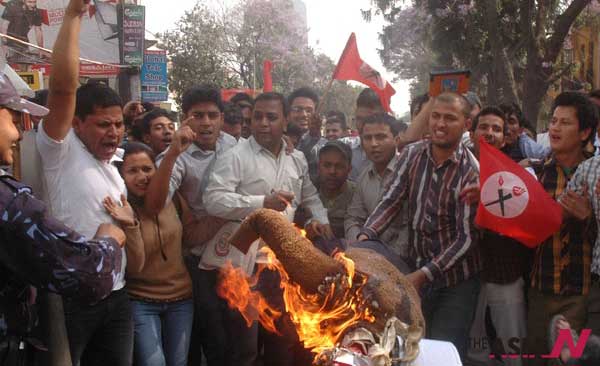Government disappoint Nepalese by recommending Karki for CIAA chief

Students burning an effigy in Kathmandu protesting against Lok Man Singh's recommendation to the anti-graft body. (Photo: ekantipur)
Kathmandu – Recommendation of the Constitutional Council to appoint former chief secretary of Nepal Governmnet to the post of the chief of the anti-graft body has drawn flak from the civil society leaders, student organizations, lawyers and journalists.
The Constitutional Council led by chairman of the Interim Election Council (Prime Minister) Khilraj Regmi had recommended the name of Lokman Singh Karki, who was appointed chief secretary during the direct rule of former king Gyanendra Bir Bikram Shah, to lead the Commission for Investigation of Abuse of Authority (CIAA), one of the powerful constitutional bodies of Nepal on Sunday.
The student organizations, lawyers and the civil society representatives on Monday protested against the recommendation in front of the Office of the President urging President Dr. Ram Baran Yadav not to endorse the recommendation.
On Sunday, civil society leaders met the President and told him that Karki should not be appointed to the key post. They said that Karki had involved in suppressing the April Uprising of 2006 and was convicted by the CIAA on the abuse of authority.
Karki, a son of powerful royalist and chairman of Rajsabha Standing Committee late Bhupal Man Singh Karki during the partyless period, had joined the civil service through a direct appointment from the king without passing the exams of Public Service Commission.
Earlier, a high level political mechanism comprising chiefs of four key parties—Unified Communist Party of Nepal (Maoist), Nepali Congress, Communist Party of Nepal—Unified Marxist and Leninist and the Front of Terai based parties—had recommended his name for the post.
However, when the second generation leaders of the Nepali Congress and CPN-UML opposed the recommendation, the chiefs of the two parties were in the mood of withdrawing the recommendation. But Regmi made the recommendation before the meeting of the high level mechanism was to convene at the pressure of the Maoist chief Prachanda (Pushpa Kamal Dahal). Karki was advisor to the communist leader after the fall of monarchy.
The agitating civil society leaders had claimed that Prachanda wanted to appoint Karki in the anti-graft body only to avoid any corruption charge that might be filed against him and leaders of his party. A section of media and politicians have been portraying Prachanda as a corrupt leader. According to them, he received billions of rupees paid to the Maoist combatants by the state during the peace process period.
Interestingly, CPN-UML, one of the parties included in the high level mechanism, was also reported to have submitted a memorandum to President opposing Karki’s recommendation.
Moreover, the media houses were sharply divided regarding Karki’s recommendation. The Kantipur Daily, the dailies with the highest circulation in Nepal, has been publishing news opposing Karki’s recommendation while its rival dailies have supported Karki and criticized Kantipur.
Annapurna Post, one of the dailies (Nepali language), printed a front page story Sunday stating that the Kantipur was opposing Karki’s appointment fearing that he (Karki) might take action against its publisher for evading tax.
It is noteworthy to mention here that the Annapurna Post is owned by a rival businessman of the owner of the Kantipur. Even the commoners looked unhappy with the recommendation. The social media like facebook are full of comments criticizing the political parties for recommending Karki to the key post.
A few of postings on the facebook suggested that Karki was recommended to the post by the key political parties under the pressure of the Indian establishment!
Although it will be too early to predict the move of the President, Karki’s recommendation has eroded the faith of people as well as the civil society on the political parties and the election government.
Karki’s appointment to the anti-graft body will be highly disappointing, said Bishnu Nisthuri vice chairman of Asia Journalists Association and former chairman of Federation of Nepali Journalists, who was in the forefront during the democratic movement of 2006.





















































































